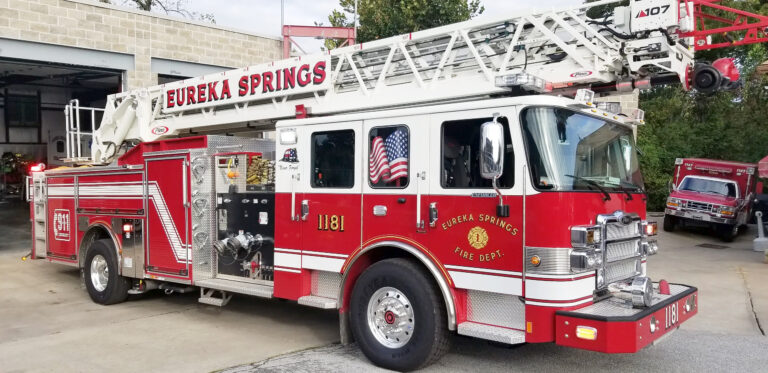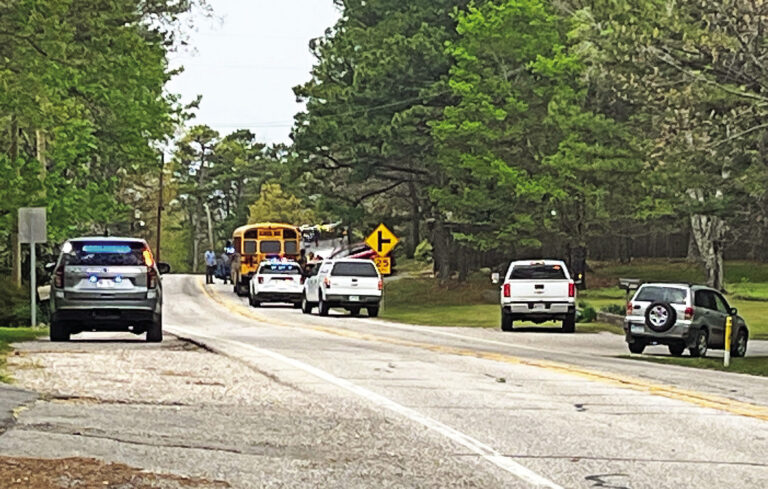Former Eureka Springs fire marshal and assistant fire chief Jim Kelley retired earlier this year, criticizing what he described as the “Downfall of the Fire Department” in a letter to fire chief Nick Samac.

“As assistant chief/fire marshal, I have always felt the responsibility to the citizens that I took an oath to serve and have tried to both learn my job and do my job to the best of my ability,” Kelley writes in the April 17 letter to Samac, obtained by the Lovely County Citizen through a request pursuant to the Arkansas Freedom of Information Act. “I have strived to hold myself and our department to the highest standards as I felt our citizens expected of us.
“Sadly, over the past few years I have found myself to be in the minority of this mind set and have found myself constantly struggling with no success in maintaining the high standards of our department that I appreciated when I joined as a volunteer in 1987. Over the years I have seen a constant decline in dedication of our department both paid and volunteer personnel to train for and respond to calls as I think the citizens expect us to. As we at ESFD have seen all other departments receive decent raises this year, the ESFD staff did Not even getting a cost of living raise for over two years as the city has shown an increase in the tax revenue and has been showing a surplus. This has also affected my decision to leave ESFD.”
Kelley, 61, was promoted to full-time status with the fire department on Aug. 16, 1990, according to documents obtained by the Citizen. He had previously served in a volunteer and part-time role, although documents released by the city did not indicate exactly when he began working for the fire department. He had held the title of assistant fire chief since at least August 2002, according to documents reflecting his pay increases through the years.
The earliest of those documents, dated July 8, 1991, shows Kelley receiving a 5 percent cost-of-living raise from $6.85 to $7.19 a hour. The most recent, dated Feb. 20, 2020, shows a 2 percent cost-of-living increase and a 1 percent merit raise, bringing Kelley’s salary from $21.85 to $22.51 an hour.
“As the asst. chief, I am expected by the public and other departments to be one of the leaders that set the standards in our department,” Kelley writes in his letter to Samac. “When they look at us as substandard, it reflects on me as well. I have not had the support I need to maintain the standard I think we are held to, and it both frustrating and an embarrassment to me that we have gotten to this level. I have struggled with this decision for over a year now. It is not what I wanted to do but rather what I have to do. I am only so direct with my reasons for leaving in hopes that it will help you realize what others are thinking but not in the position to speak up and tell you. A fire department will only have a standard as high as a chief sets it to be.
“I can’t make the change alone and it is for this reason I want to disassociate myself from the Eureka Springs Fire department after 34 years of service and wish to take my retirement.”
Kelley’s letter to Samac includes three additional pages with the heading of “Downfall of the Fire Department,” in which he outlines in detail some of the issues that he writes led to his decision to retire.
Those issues, Kelley writes, included poor response to calls, lack of training, a failure to develop and implement standard operating procedures and a lack of appreciation and compensation.
Kelley writes that over the past few years he has arrived on fire scenes and requested that all personnel be dispatched only to have three or four people show up.
He adds that although the department has a roster of around 30 firefighters including a paid staff of 12, attendance at calls and training has dwindled to just a handful.
“I am not blaming the chief totally for this, as there is decline in volunteerism around the country,” Kelley writes. “However, as the chief he can demand training and response from the paid staff and require the volunteers to attend the required minimum or drop them and not just ignore it. Set the example by getting involved himself.
“I realized recently how other departments are viewing us as substandard in fire training, fire tactics and substandard pay, to the point they will not work for us anymore.”
Kelley also describes issues with staffing for the department’s ambulances.
“The city signed a contract to provide two ambulances and have a third backup when needed by off duty staff but I often tone for third out crew and maybe two times in one day and we sometimes get an EMT to stand by but most of the time NO medic to take the call if needed. This is going to catch the city one day if staffing is not beefed up somehow.”
Kelley writes that there are no standard operating procedures and “each shift is going a different direction,” with two employees who are “constantly late for work,” causing others to have to remain at work until they arrive.
“This creates overtime for the people that have had to stay over,” Kelley writes, adding that the two employees who are habitually tardy are “friends of the chief.”
Kelley writes that the department fails to use a “safety spotter” when backing fire trucks or ambulances, except on his shift.
“The other shifts, including the chief’s shift do not require a spotter and are constantly repairing the bumpers on trucks due to this laziness,” Kelley writes. “This is a safety issue and a costly one for the city for repairs.”
Kelley also writes that training for paid firefighters and volunteers is not mandatory, with attendance at monthly training nights often limited to the on-duty crew, three of more than 20 volunteers and two to three of the off-duty paid staff.
The fire department staff didn’t receive raises for two years, Kelley writes, although other city employees were given “very good raises.”
“When the paper reported the mayor was given a very large raise, this was a big slap in the face to all of us,” Kelley writes.
The Eureka Springs City Council in April approved an ordinance increasing Mayor Butch Berry’s salary from $18,000 to $48,000.
“What you are seeing now is people leaving the Eureka fire department because you can pay people poorly and if they like the environment they will tolerate low pay for a little while,” Kelley writes. “If the environment is not good and the pay is not good, you will only keep those who can’t leave for one reason or another or are too lazy to work anywhere else.”
Kelley’s letter said his last day of work would be May 2, but he would use his accrued vacation time and his final day of employment would be June 1.
James Cowan now serves as fire marshal.
Samac said Monday he had no comment on Kelley’s retirement. A telephone number listed for Kelley was disconnected.


